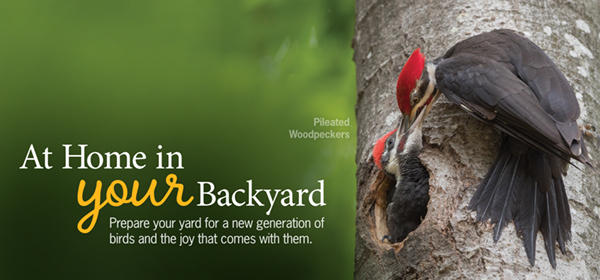
The Joy of Nesting Birds
There are a lot of things in nature that can bring you joy…to name all of them would take many pages. But most certainly one item on the list would be the sights and sounds of young birds making their first appearances in your yard and at your feeders.
It’s hard to describe the emotions of seeing freshly-fledged bluebirds being brought to the feeders by their dad, or the joy in watching the antics of fledgling chickadees and goldfinches as they endlessly harass their parents to be fed. Our woodpeckers never fail to entertain as their youngsters clumsily learn the ways of using a bird feeder or as they wait patiently behind a nearby tree for an adult to share a bill full of suet or Bark Butter®.
Yes, a new generation of birds is entering the world and we can find joy in knowing that the food and housing we provide can make a significant difference in how well they will survive and thrive.
Research studies have shown that birds with reliable access to bird feeders will often lay their eggs earlier than those without feeders. This is significant because, earlier broods have less competition and typically have better rates of survival and fledging success than later ones.
Feeders also allow breeding females to spend less time searching for food and more time selecting better nesting sites and constructing higher-quality nests. The parents will also have more time available for protecting their nest, eggs and young from predators.
When abundant feeder food is accessible to parent birds they are free to spend more time searching for a wider variety of natural food resources for their young. Studies have shown that this extra nutrition reduces aggression among nest siblings and increases their rate of growth.
But food is not the only key in helping birds to nest successfully in your yard. A properly designed and installed nesting box can make a significant improvement in nesting success rate, especially during extreme periods of cold and damp weather.
Equally important is the quality of your yard’s natural habitat. Start by keeping your yard a little messy. Birds can’t always find the natural resources needed for nest building in an immaculately groomed yard. In addition, consider planting native trees, shrubs and wildflowers as these will provide nesting space and food resources that may be missing from your yard.
And don’t forget your feeders! Wild Birds Unlimited’ s Nesting SuperBlend® and Bark Butter products are great foods to help you provide the essential protein and calcium needed by nesting families. Nesting SuperBlend is packed full of sunflower chips, peanuts, mealworms, Bark Butter Bits, Nutrasaff, tree nuts and calcium. This blend is perfect for birds getting ready to nest, while they nest and for the young when they leave the nest.
Joy comes from nature not only in what we see…but also in what we do. And there is certain joy in knowing that you helped to make a difference for the birds that choose to raise their families in your yard.

